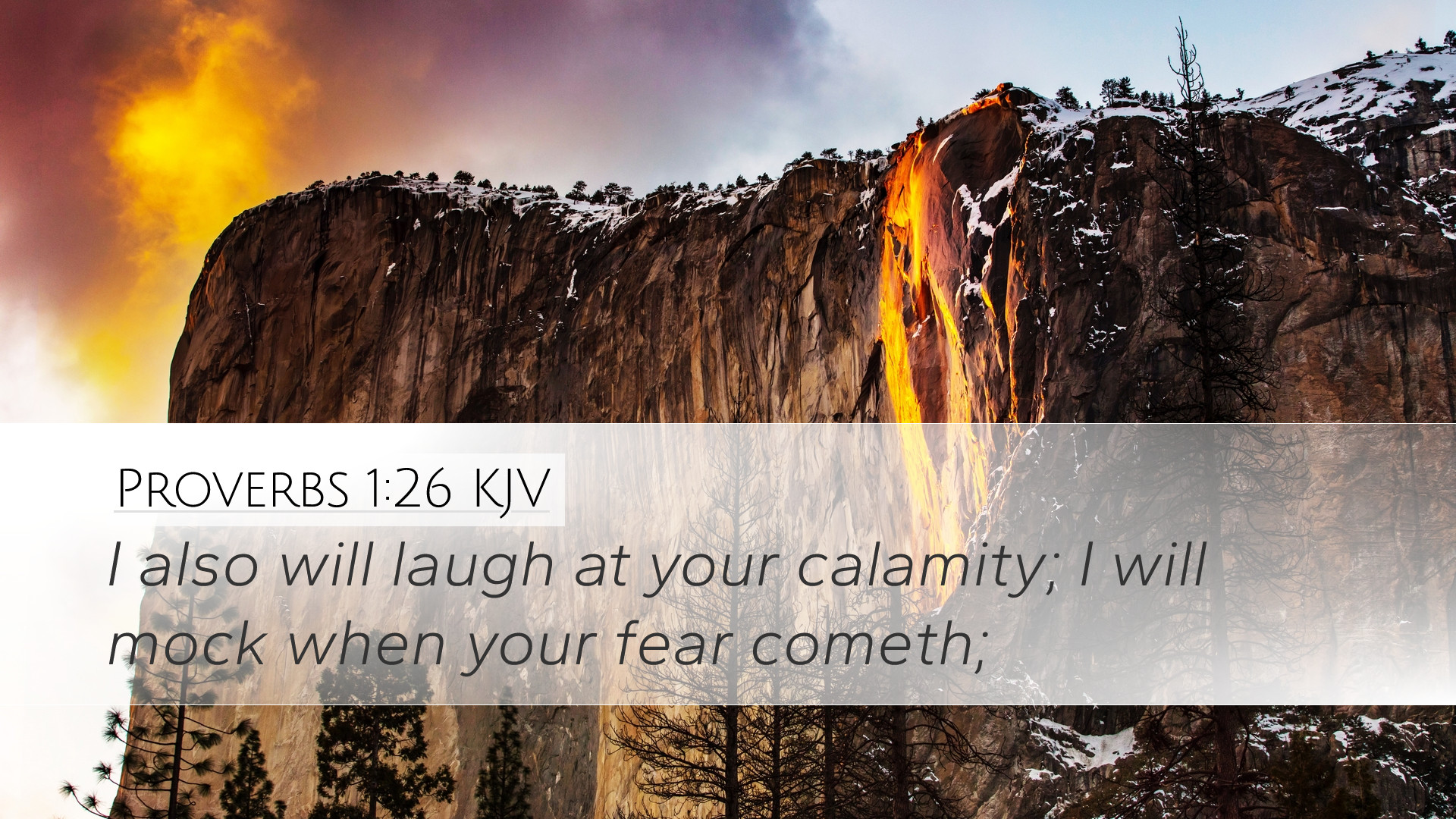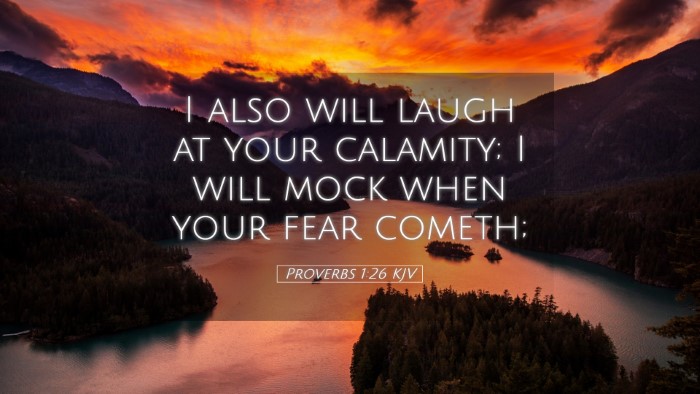Commentary on Proverbs 1:26
Proverbs 1:26 states: "I also will laugh at your calamity; I will mock when your fear cometh." This verse serves as a potent reminder of the consequences of forsaking wisdom. It expresses the seriousness of ignoring the call of wisdom and the resultant consequences that ensue. The following commentary synthesizes insights from multiple public domain sources, including Matthew Henry, Albert Barnes, and Adam Clarke, to illuminate the profound meanings embedded within this verse.
Contextual Understanding
To grasp the weight of Proverbs 1:26, it is essential to understand its context within the larger narrative of Proverbs. This book is often regarded as a collection of wise sayings aimed at guiding individuals toward a prudent and righteous life.
Henry emphasizes that the opening chapters of Proverbs are particularly focused on the invitation of wisdom, characterizing it as a vocal entity that calls out to humanity. The rejection of this call leads to dire ramifications, which the writer vividly articulates in this verse.
The Voice of Wisdom
Albert Barnes reflects on the personification of wisdom throughout Proverbs. In this chapter, wisdom is depicted as a teacher who desires to guide people, but when individuals choose to ignore its counsel, the consequences are dire. Wisdom, personified in this context, expresses both sorrow and indignation at the folly of humanity.
The Dual Nature of Wisdom's Response
- Mockery as a Reflection of Choices: When wisdom responds with laughter and mockery, it signifies not a base cruelty but a righteous acknowledgment of the choices that led to calamity. Henry posits that this form of mockery serves to illuminate the folly of rejecting wisdom.
- The Absence of Wisdom: Clarke notes that the laughter of wisdom is a lament for the lost opportunity of those who chose to turn away. Wisdom's reaction is not one of pleasure in the suffering of others but rather a consequence of inevitable calamity faced when one disregards sound counsel.
The Consequences of Rejection
Both Barnes and Clarke expound on the notion that calamity often follows the rejection of wise counsel. This calamity serves as a judgment that reveals the folly of those who failed to heed wisdom's call.
Examples from Scripture
Throughout the Bible, various narratives illustrate this principle. The story of King Solomon, who began with immense wisdom but later turned away from his teachings, stands as a caution. His eventual downfall underscores the reality that to forsake wisdom is to invite calamity.
Practical Implications for Believers
- Heeding Wisdom’s Call: Pastors are reminded to encourage their congregations to actively seek wisdom in all areas of life, as refusing to do so can lead to significant spiritual and practical tribulations.
- Understanding Consequences: The theological implications are profound; students of Scripture are called to understand that the path of wisdom is a protective measure against the tumultuous storms of life.
- A Call to Repentance: The mocking of wisdom also serves as an invitation to repentance, indicating that even in their folly, individuals can turn back and embrace wisdom.
Theological Reflections
This verse encapsulates a critical theological reflection on the character of God as it relates to human choices. Divine wisdom offers not just guidance but also the freedom to choose—or to reject. When individuals choose the latter, they encounter the natural consequences that arise from their decisions. The laughter of wisdom can thus be understood as an embodiment of divine justice, highlighting the importance of aligning oneself with God's ways.
Conclusion
In summary, Proverbs 1:26 serves as a firm warning to those who would turn away from wisdom. The synthesis of insights from Henry, Barnes, and Clarke deepens our understanding of wisdom as both a guide and a judge. As believers, understanding this interplay serves to reinforce the importance of seeking wisdom actively, recognizing that it is paramount for a life that honors God and reflects His righteousness. The laughter of wisdom at calamity ultimately beckons us to introspect on our choices and seek the ways of understanding with fervent devotion.


